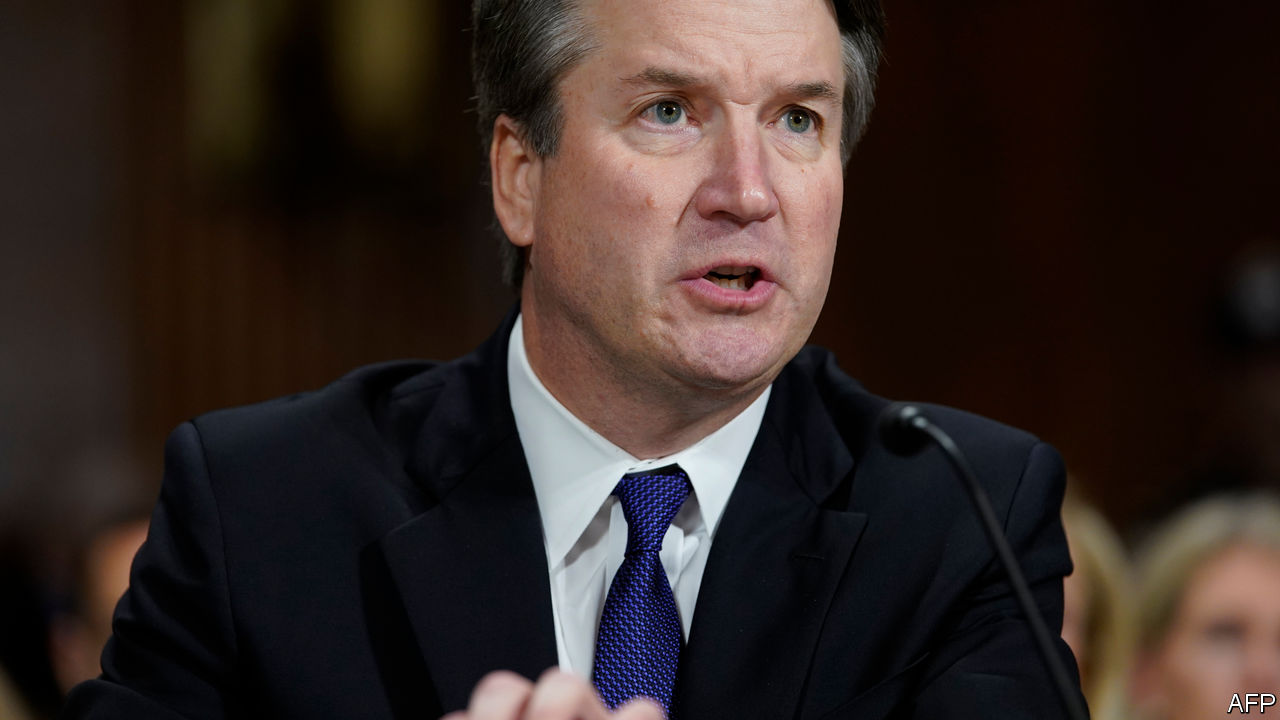
ALMOST three months to the day since Donald Trump nominated him to the Supreme Court, Brett Kavanaugh was confirmed on Saturday afternoon by a 50-48 margin. The saga ended in a manner appropriate to the United States Senate: with neither a bang nor a whimper, but with hours of pointless verbiage preceding the final vote just before 4pm. Protesters repeatedly interrupted, but the outcome was not in doubt. On Friday afternoon the previously wavering Joe Manchin and Susan Collins, Democrat and Republican respectively, confirmed that they would vote for Mr Kavanaugh, despite finding the testimony of Christine Blasey Ford, who has accused him of sexual assault, “credible”. Mr Kavanaugh could take his seat on the bench as early as Tuesday—but the repercussions will be felt for years to come.
Poll upon poll has shown that Americans respect the Supreme Court more than Congress or the presidency. It is seen—and its legitimacy depends on its being seen—as a trustworthy, more or less neutral, arbiter: not apolitical, necessarily, but not tied to the partisan fray, like the other two branches. That view may be on its way out.
For some on the left, this falling of the scales is long overdue. The court’s jurisprudence has been listing rightward for decades, and some Republicans made no bones about viewing the court as an instrument of political power. It is time, say some, for the left to play hardball too. Perhaps. But with Mr Trump already testing American institutions, the weakening of one more is something to be accepted with resignation, not glee.
And Mr Kavanaugh is not just one more conservative jurist. He worked in George W Bush’s White House and on Ken Starr’s team investigating Bill Clinton before taking his place on the federal bench 12 years ago. At his second hearing he dispensed with the mild neutrality offered by most nominees, and launched instead into an intemperate diatribe, treating Democratic senators with contempt. His performance was sufficiently inflammatory for him to follow up with an op-ed in the Wall Street Journal in which, without really apologising (“I said a few things I should not have said,” he wrote, but “I hope everyone can understand that I was there as a son, husband and dad”) he pledged to be “independent” and “impartial”. This was too little, too late.
For as long as he sits on the court, Democrats will doubt his impartiality—and hence the legitimacy of every 5-4 ruling that they lose. They will no doubt remind their voters that two of the five conservative justices ruling on abortion rights and gender discrimination have been accused of sexual misconduct, and four of the five were nominated by presidents who lost the popular vote. Some on the left have already started to mull court-packing (increasing the number of justices) should they win Congress and the White House in 2020. Such talk will probably come to nothing, though. Contemporary Democrats are, for the most part, institutionalists.
The same cannot be said for Republicans, as this entire episode shows. Only after Ms Collins and Jeff Flake, a Republican senator from Arizona who is retiring, vowed not to confirm Mr Kavanaugh without investigating the claims made against him did Senate Republicans agree to do so. The FBI investigation lasted just a week, and interviewed neither Mr Kavanaugh, nor Ms Ford, nor any of the multiple witnesses who claimed to be able to corroborate the accusation of Deborah Ramirez, who said Mr Kavanaugh had exposed himself to her. In other words, it was less an investigation than an “investigation”, designed to tick the box without ever running the risk of uncovering anything embarrassing to the nominee.
It was foolish to expect anything else from this Congress. For almost two years, congressional Republicans have abdicated their constitutional responsibility to check and balance, and instead have dedicated themselves to shielding Mr Trump—by doing what they can to frustrate Robert Mueller’s investigation into alleged links between the president’s campaign and Russia, or batting not an eye at a report in the New York Times that attributes much of Mr Trump’s wealth to what it calls “dubious tax schemes”. It is partisanship all the way down.
Indeed, Mr Kavanaugh’s nomination appeared in doubt until Mr Trump spoke up. After days of remaining calm, even complimentary toward Ms Ford, he mocked her at a rally in Mississippi last week. The audience loved it. Mitch McConnell, the Senate Majority leader, crowed that the fight over Mr Kavanaugh is “a great political gift for us. The tactics have energised our base.” He is right: the Democrats’ enthusiasm gap has faded in recent weeks. They still look likely to retake the House, but the Senate appears farther from reach. Whether that trend persists for the next four weeks is unclear. Grievance is a powerful motivator, and having lost the confirmation battle, Democrats have more reason for it than Republicans do.








